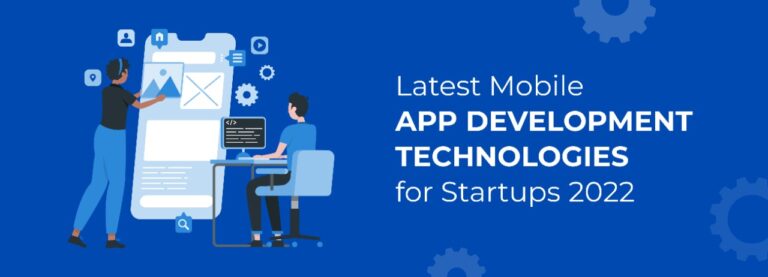The Latest Mobile App Development Technologies


The latest mobile app development technologies is the buzzword among people and organizations these days. This is because mobile apps can be used anywhere and anytime and they enable businesses to leverage the global reach and influence of the internet in a convenient manner but what are the technology stacks used in mobile app development? What programming languages are used in each technology stack and what are the factors to be considered before choosing an app development platform or coding technology for mobile app development? All these FAQs will be answered by the end of this article, so read on.
Table Of Contents
What is tech stack in mobile app development?
Most Widely Used Mobile Application Development Technologies
Factors Considered While Choosing The Right Technology Stack For Mobile App Development
What is tech stack in mobile app development?
Technology stack refers to the various phases of a mobile app development project during which different app functionalities are developed for various purposes. Technology stack is classified into three broad categories which are listed below.
Frontend Mobile App Development
The frontend app development phase involves building the app’s UI and other important features that enable users to interact with the app. The app’s core functionalities are usually built in this phase of app development.
Backend Mobile App Development
This app development phase involves building features on the app that can handle database creation requirements and connection requests that arise when users interact with the app. These are the functionalities of the app that users are not concerned about but which are required for the smooth flow of business operations.
Add Ons
After meeting all of the app’s design and functionalities requirements, a round of discussion is held with the client to verify the correctness of the project done and to check if the client requires any additional app features and functionalities.
If additional app features and functionalities are required by the client, they are incorporated into the app if possible. This practice is upheld to ensure 100% client satisfaction and integrity of the app development project undertaken.
The Most Widely Used Mobile Application Development Technologies
The following are the most widely used coding technologies for mobile app development. These technologies are used to create both native and cross-platform apps. The following coding technologies are swift, secure, scalable, and feature-rich. The following are the most widely used coding technologies for mobile app development. These technologies are used to create both native and cross-platform apps. The following coding technologies are swift, secure, scalable, and feature-rich.
Kotlin
Kotlin is a more concise and secure programming language than Java for building mobile apps. It is used to build native Android apps. Kotlin was initially designed to provide functional support for JVM but has now been upgraded so that it can be used in tandem with Java for mobile app development.
Popular mobile apps like Coursera, Foursquare, Trello, Basecamp, Capital One, Coin Switch Kuber, PubG, etcetera have been coded in Kotlin.
Swift
Swift is coding technology developed by Apple in 2014. It had replaced the Objective C coding technology previously used by Apple’s devices such as iPhones, iPads, Apple laptops and desktops, etcetera. The Swift programming language is used to develop native iOS apps. Apps designed using Swift are extremely fast and feature-rich.
Some popular apps designed using Swift are LinkedIn, Accenture, Lyft, CNN, Jumbo Race, etcetera.
Java
Good old Java is used to develop native Android apps. Next to Python, it is one of the world’s most advanced and versatile object oriented programming languages.
The language is capable of offering open source libraries, community support, and outstanding documentation supporting developers when it comes to building different Android applications. Java’s multithreading feature and vast libraries enable the creation of advanced and graphics-heavy mobile applications.
Some popular apps designed using Java are Spotify, VLC Media Player, Telegram, Twitter, Omni Notes, Counter Strike versions, etcetera.
Python
We bet many of you were expecting this option and rightfully so. Python is easily the world’s most robust and versatile programming language with many applications. So, obviously, hi-tech and cross-platform mobile apps can be developed using only a tiny fraction of Python’s vast libraries and capabilities.
Python’s web application frameworks like Django, Flask, Cherry Py, and Web2Py can be used to build swift, secure, scalable, interactive, and cross-platform mobile apps. Apps built using Python are feature-rich yet have a user-friendly GUI which makes them easy to use.
Flutter
Flutter is an open-source SDK (Software Development Kit) designed by the Silicon Valley tech behemoth, Google. Flutter uses the Dart programming language to develop swift and secure cross-platform apps.
Popular apps developed using the Dart coding technology include: Alibaba, Google Ads, Hamilton Musical, Reflectively, etcetera.
React Native
React Native is an open-source SDK developed by Meta (formerly known as Facebook) and Microsoft on 26/03/2015. It was developed after a ground-breaking discovery was made by Facebook’s engineer, Jordan Walke.
Jordan Walke discovered that apps that were coded in Javascript retained about 90% of their original source code when being redesigned for iOS. It was since this discovery that cross-platform SDKs and apps began gaining popularity and demand.
Some popular apps designed using React Native are: Myntra, Facebook/Meta, Airbnb, Zomato, EaseMyTrip, etcetera.
Xamarin
Xamarin is an open-source SDK acquired by Microsoft in 2016. It employs the C# coding technology and the .net framework to design cross-platform mobile apps.
Though Xamarin cannot support apps that require multi-touch functionalities, it can be used to build top-notch gaming apps and other apps that require only a single-touch functionality.
Some popular apps built using Xamarin include Oyo, Story Creator, MRF, Captio, CA Mobile, Pinterest, Skype, The World Bank, Fresh Direct, etcetera.
R
You read it right. R is a recently developed programming language used to build cross-platform analytics-oriented apps. It has vast and robust math and graphics libraries that can be used to build analytical, graphics-oriented, and CAD-based apps.
Mobile applications that make extensive use of the Machine Learning technology are best designed using the R coding technology. Since this is a very recent coding technology (launched only a few months back), not many apps have been coded via it and have become popular.
What Are The Factors To Be Considered For Choosing The Right Technology Stack For Mobile App Development
The Latest Mobile App Development Technologies Now that you have come across all the popularly used mobile app development SDKs and coding technologies, you might be wondering which one to choose and how to choose the apt coding technology and SDK (if applicable) for your mobile app.
Don’t worry. We’ll help you make the right decision. These are the factors to consider before deciding on any app development coding technology and SDK.
The Demographics Of Your Target Audience
Android apps are more popular in certain nations of the world while iOS apps are more popular in others. Depending on the nation in which your company is based, you must decide upon developing an official app for Android or iOS platform.
Android apps are generally widely used in developing nations like India, China, Malaysia, Cuba, Brazil, etcetera. Android apps are also used extensively by lower middle class and middle class people.
iOS apps are generally widely used in developed nations like the USA, Canada, Japan, Singapore, Australia, etcetera by tech savvy people. iOS app users also spend five to ten times more than Android app users on in-app purchases. So, if you’re trying to make people buy something via your app then developing an iOS app would be a wise choice.
The Age Of Your Target Audience
If your app is mostly meant for people above the age of 30 then you’re better off developing an Android app because most of the Android users presently are aged above 30.
On the contrary, if you want to develop a hi-tech gaming or other purpose app meant for teenagers and people in their mid 20s, then you’re better off developing a native iOS app as iOS users are big fans of hi-tech mobile apps and are mostly aged between 13 and 29.
The Demands Of Your Target Audience
If your target audience is the common man who meets his daily needs via various on-demand delivery apps, then you’re better off designing an Android app via concise coding technologies like Kotlin or Python.
If your target audience are highly educated people, tech savvy people, aristocrats, businesses, or entrepreneurs who demand advanced apps like business analytics apps, graphics-heavy gaming apps, apps that extensively use AI, Machine Learning, and CAD technologies then you’re better off designing a native iOS app to meet such demands.
The Budget And Timeline Constraints Of Your Project
If you have a relatively low budget for your app development project and if it needs to be completed relatively quickly (within a few months) then you’d be well advised to develop a native iOS app as iOS apps can be developed 30 – 40% quicker than Android apps and cost about 20 – 30% less to develop.
Determine If You Want To Reach Out To And Satisfy All
If your goal is to develop an app that can be used by all for some of the most common purposes then you can consider developing a cross-platform app using any one of the popular SDKs like React Native, Flutter, Xamarin, R, or Python.
Cross-platform apps can definitely satisfy the requirements of all users and can be run on any mobile OS platform but their performance has been observed to be a shade lower than native apps. So, kindly keep this in mind before opting to develop cross-platform apps.
Your App Must Adhere To The Respective App Store Guidelines
Apart from being fully featured yet easy-to-navigate (via a robust yet simple to use GUI), your app must adhere to the App Store’s guidelines it was designed for. Android’s app store is called Play Store and iOS’s app store is called The App Store.
Cross-platform apps must satisfy the guidelines of both the app stores before they can be launched into the app market. The guidelines basically deal with the ease of use and performance of your app.
If your app is easy to navigate, feature rich, fast, and has no objectionable or controversial content then it’ll get approved by the app stores quickly and be launched into the app market quickly lest your app will get rejected by one or both the app stores.
Need A Hi-Tech Official App? Leave It To The Experts
If you need an advanced official app for your business, just leave the task to us. We’ll do the brainstorming and suggest the right kind of app and coding technology. We have quite a few years of proven experience in developing native as well as cross-platform apps. Our app development portfolio and exhilarated client reviews speak volumes about our technical expertise and professionalism.
Our app development team will treat your app requirements as their own and design you the most suitable app. Our extensive background in mobile app development encompasses a diverse array of industries, including courier applications, food aggregation, cloud kitchen services, hospitals, and other customized solutions. All you have to do from your end is to discuss your app development plans with us.
Conclusion
In conclusion, The Latest Mobile App Development Technologies continues to evolve at a rapid pace, introducing technologies that reshape the way we interact with digital solutions. With cross-platform frameworks, immersive realities, intelligent algorithms, and heightened security, developers are armed with an arsenal of tools to craft apps that not only meet user expectations but also exceed them. As we look to the future, staying curious, adaptable, and committed to learning will be key in harnessing the power of these latest technologies to create mobile apps that inspire, delight, and make a meaningful impact.

The Author
Gopinath Murugaiyan
Managing Director




